Packing for a trip can be one of the most stressful aspects of travel. You want to be prepared for any situation, but you also don’t want to be weighed down with too much baggage. With so many factors to consider—activities planned, climate, duration of travel—it’s easy to become overwhelmed. And in those frazzled moments, common packing mistakes get made without you even realizing it.
From overpacking to forgetting crucial essentials, these packing pitfalls can set your trip up for failure before it even begins.
Assuming Your Accommodations Will Have What You Need
It’s not unreasonable to expect that your hotel room will be stocked with everything you need—from toiletries to hair dryers. While this may be true of high-end hotels, we’ve definitely turned up at budget hotels to find a lone bar of soap in the shower, or even to a vacation rental that turned out to be a “bring your own linen” situation.
When you’re making your packing list, check to see what amenities your hotel or vacation rental supplies, to see what toiletries and other comforts you’ll need to bring (and what you can leave behind.)
Overpacking
Keep throwing in extras like high heels or dress pants “just in case,” and you’re going to wind up with an overstuffed bag. You’ll end up regretting overpacking every time you have to sit on the bag to close it, dig through a mountain of clothes to find what you need, or struggle to lift it into the overhead compartment.
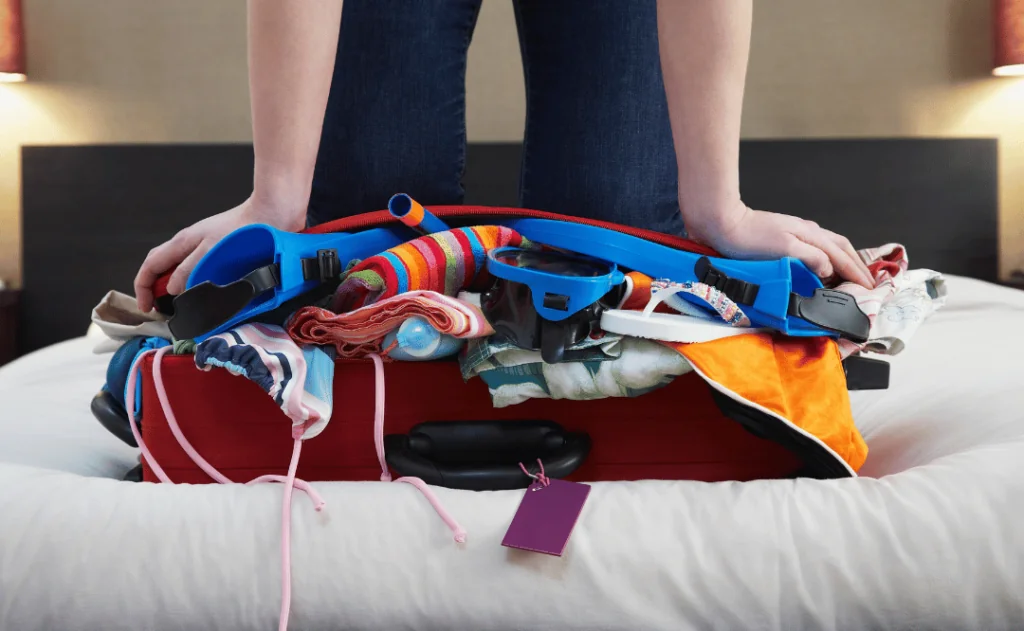
After you’ve packed everything, carefully cross-reference your packing list against what you’ve brought and challenge yourself to eliminate two or three items to lighten your load.
Counting on Carrying On
If you’ve managed to streamline your packing to fit into a carry-on bag, you should get to enjoy the privileges of traveling lightly—namely, being in control of your own luggage rather than ceeding it to the airline.
Unfortunately, as airlines continue to raise checked baggage fees, more and more flyers are fighting for overhead space, and you may be forced to check your bag at the gate, especially if you’re in a later boarding group.
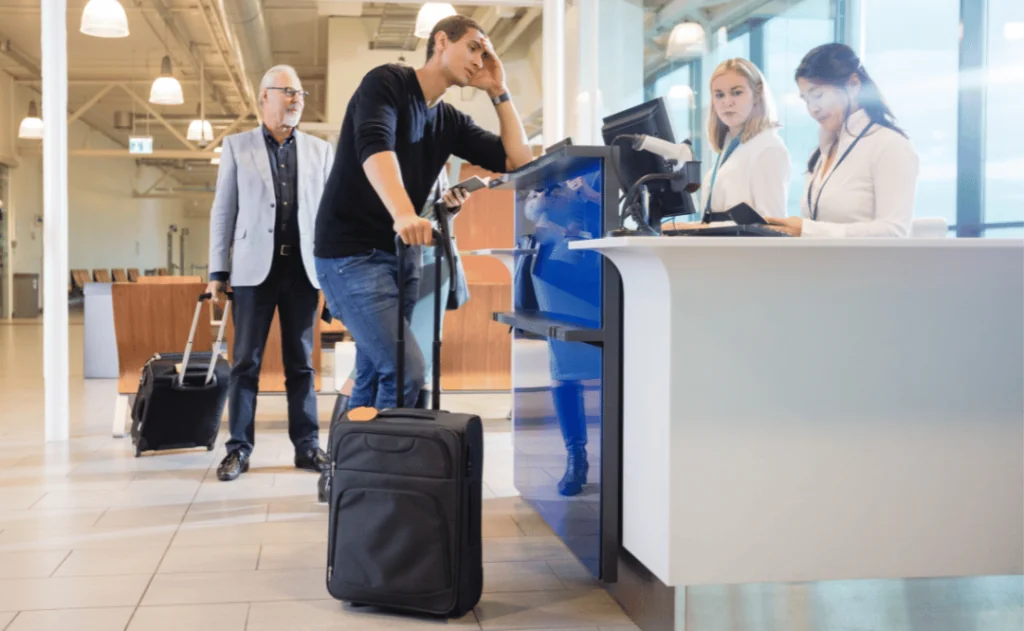
If you have to unexpectedly check your suitcase and it gets lost, you could be stuck without essentials like medication or clean clothing. Plan ahead and keep your necessities (and anything you’ll need in-flight, like headphones) in a separate personal item that will fit underneath your seat.
Plan ahead and keep your valuables and essentials together in a personal item (that will fit under your seat), so that you’re not stuck on a flight without your headphones or medication.
Not Separating Your Liquids
I’m used to flying with TSA PreCheck, which means I don’t have to take my liquids out of my bag when going through security—so I’ve gotten lazy about keeping my travel-sized liquids in a dedicated bag. Unfortunately, this backfired on me when passing through airport security in Canada, where they are very strict about liquids—and I had to go through my bag to dig out every tiny container of liquids that I had strewn about in multiple spots within my suitcase.
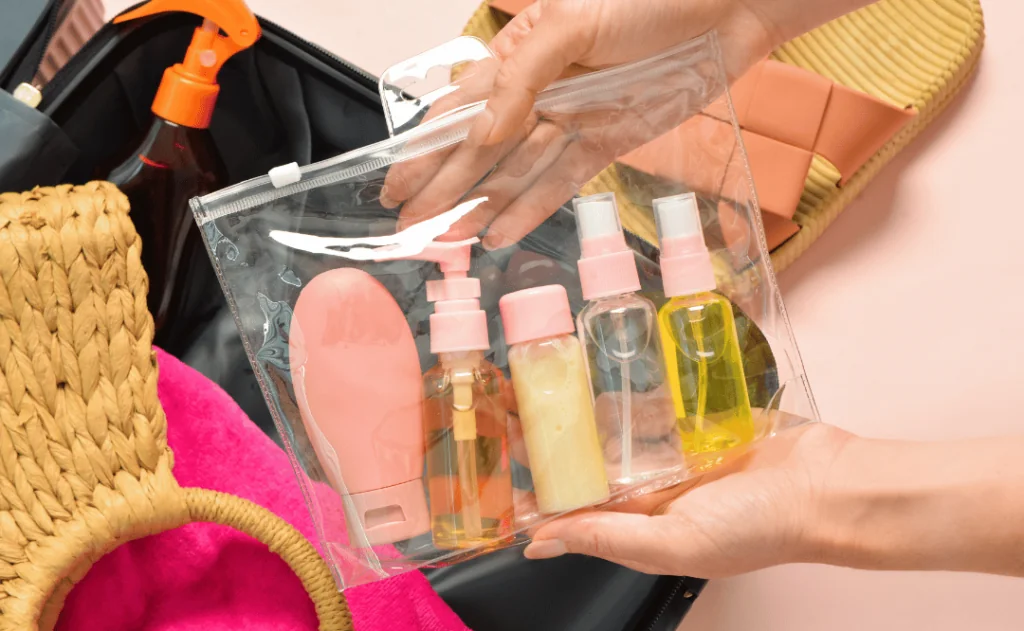
In addition to being good practice for security screenings, keeping your liquids separated in a waterproof bag is smart because it keeps any potential spills contained, making clean up easy and sparing everything else in your luggage.
Forgetting to Check the Entire Forecast
When packing for past trips, I’ve been guilty of only glancing at the forecast for the high temperatures for each day—and then seriously regretting not packing a jacket because I didn’t realize how quickly the temperatures plummeted once the sun started to go down.
When you’re packing, make sure to review the high and low temperatures for the hours that you plan to be out and about on your trip—so you know what you’ll want to wear for cold mornings and hot afternoons.
Focusing on Space and Not Weight
When packing a carry-on, we tend to focus on what bags will fit within the allowed dimensions. However, don’t forget to check weight requirements for carry-on luggage before packing, as most airlines have weight limits for carry-on luggage in addition to size requirements.
I’ve found that these limits are generally enforced on international flights, especially if you have to check in at the airport and can’t check in online. Many airlines will weigh carry-on bags at check-in, and if you’re over the allowance, you’ll have to check your bag.
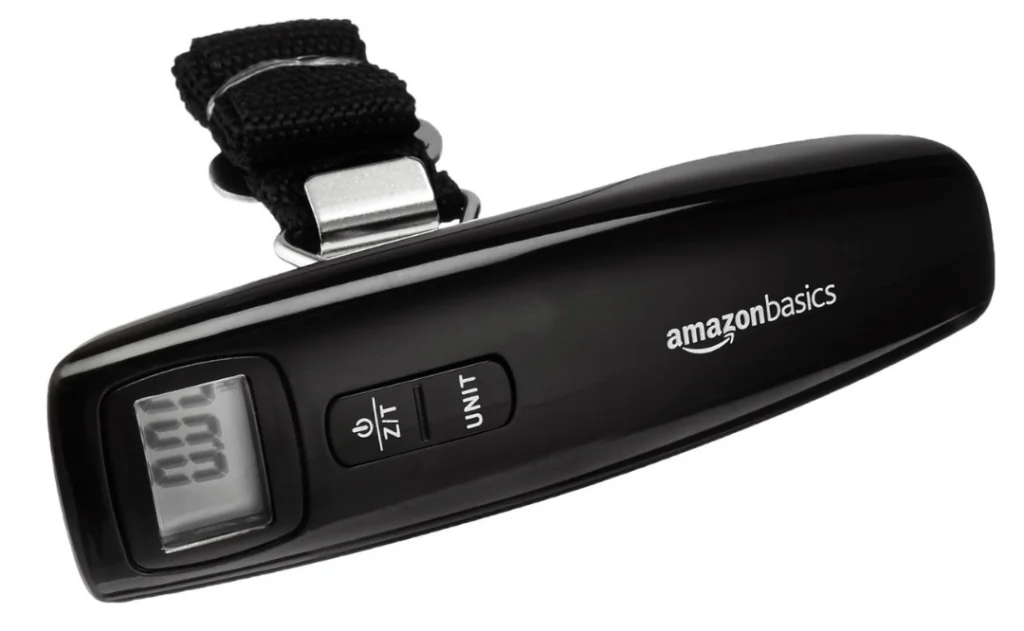
Consider investing in a small luggage scale (or just use your home scale by weighing yourself, then yourself plus the suitcase and subtracting your weight) and weighing your bag to avoid any surprises at the airport.
Using the Wrong Bag
Both backpacks and rolling suitcases have their place in the travel world—and it’s crucial to determine which option will best suit your specific trip before packing. Spinner suitcases with wheels are an excellent choice if you anticipate having to navigate multiple airports or walk for extended distances as they can help prevent strain on your back and be much easier to cart around for long periods.
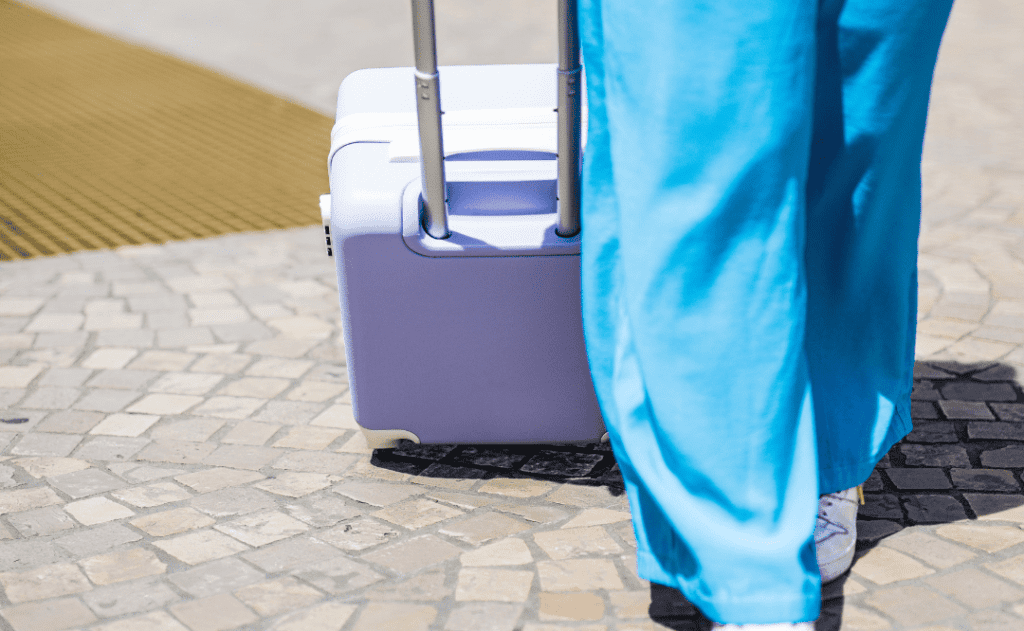
Backpacks are a better choice if your journey involves walking over cobblestoned sidewalks or climbing numerous flights of stairs, as they allow for greater mobility.
Forgetting to Leave a Bit of Extra Space
While it might be tempting to pack your suitcase to the brim and utilize every inch of available space—after all, you’re carrying the entire bag anyway—it’s essential to resist this urge. Overstuffing your suitcase will eliminate any flexibility you might need for the return trip home. For instance, you may want to wear a different, less bulky outfit on your last travel day, and will need extra space in your suitcase to pack what you wore on the journey over.
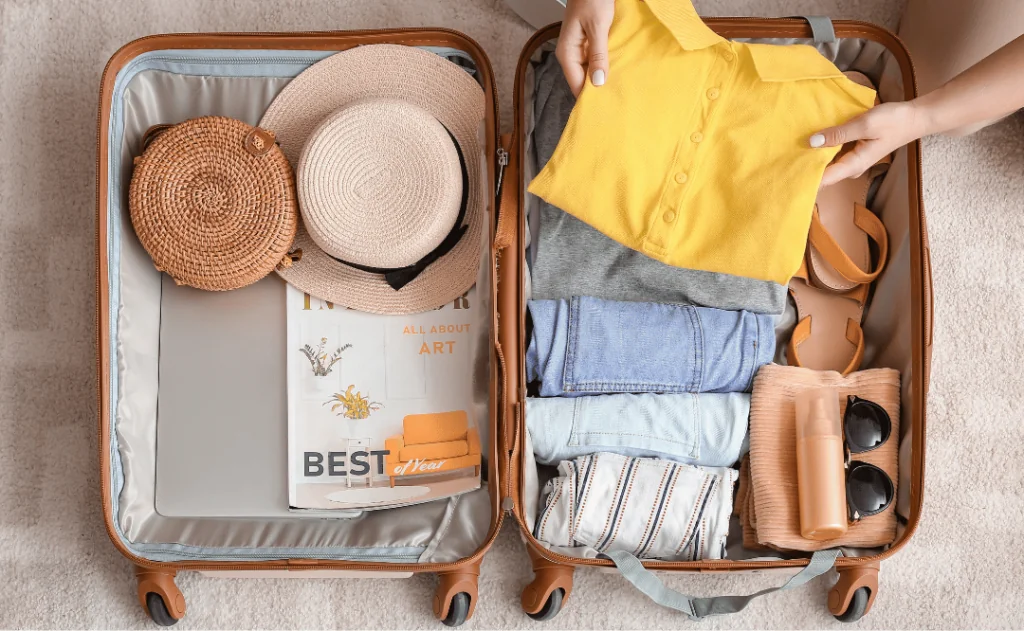
Alternatively, you might wish to purchase souvenirs or other items during your trip. In either case, having extra room in your suitcase will prove invaluable, making it easier to accommodate these additional items while keeping everything organized.
Not Packing Extra Essentials
While the idea of packing light and bringing only the bare essentials can be appealing, it’s important to factor in potential flight delays or cancellations that could leave you stranded without access to essential items.

Always pack a few days’ worth of necessities, like medications or contact lenses, in case of emergency.
Not Using a Luggage Tracker
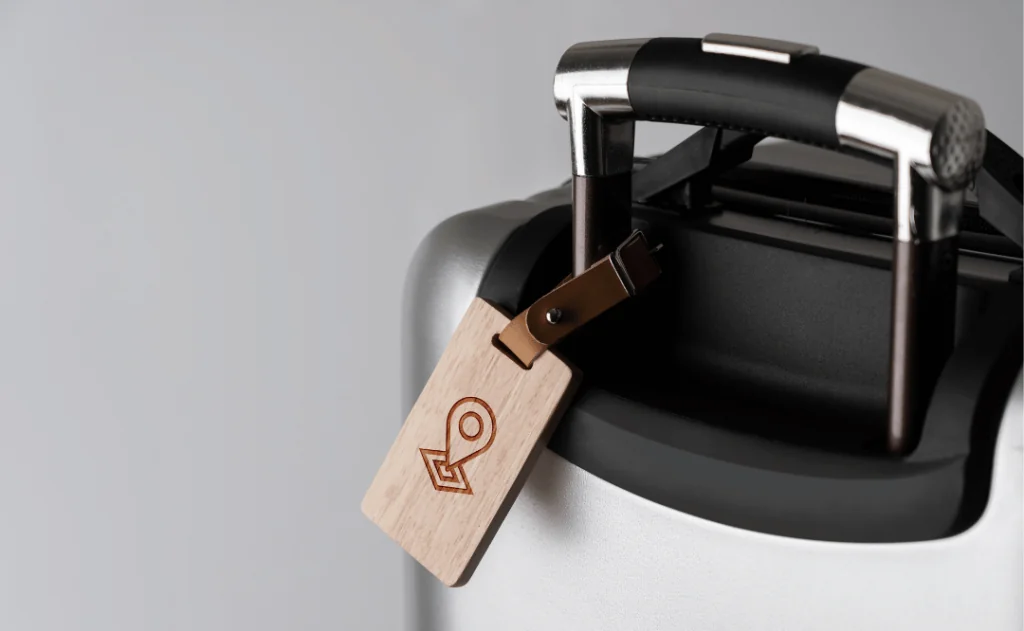
Airlines don’t have the best reputation when it comes to losing luggage. As an insurance policy, we recommend putting a luggage tracker, like an Apple Air Tag, inside your suitcase every time you travel. In the event your bag ends up at a different airport (or even the wrong luggage carousel in the same airport), a luggage tracker allows you to locate your bag yourself without relying solely on the airline.
You Might Also Like:
• Airport Security Frequently Asked Questions• 30 Ultra-Packable Travel Dresses for Summer
• How to Travel With Just a Carry-On
• 7 Things Not to Do When Packing a Carry-on Bag
• The Ultimate Toiletry Kit Packing List
We hand-pick everything we recommend and select items through testing and reviews. Some products are sent to us free of charge with no incentive to offer a favorable review. We offer our unbiased opinions and do not accept compensation to review products. All items are in stock and prices are accurate at the time of publication. If you buy something through our links, we may earn a commission.
Related
Top Fares From
Today's Top Travel Deals
Brought to you by ShermansTravel
France: 8-Night Paris, Avignon & Nice...
Infinity Worldwide Vacations
 vacation
$2880+
vacation
$2880+
Poconos: 3 Nts in Garden of...
ResortsAndLodges.com
 hotel
$305+
hotel
$305+
7-Nt Canada & New England Cruise,...
Princess Cruises
 cruise
$839+
cruise
$839+




